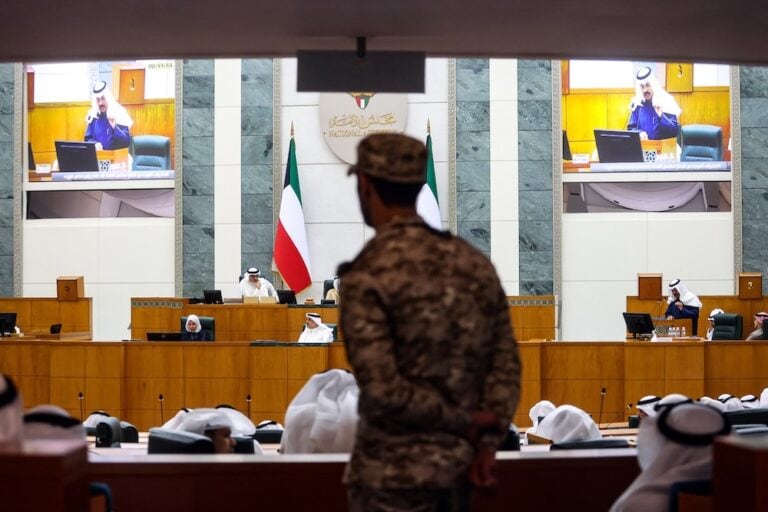(RSF/IFEX) – On 13 June 2003, RSF voiced concern about the government’s harassment of Mohammed Al-Jassem, editor-in-chief of “Al-Watan” newspaper and a staunch defender of press freedom, in the run-up to the upcoming legislative elections in Kuwait. In a letter to the information minister, Sheikh Ahmed Fahad Al-Ahmed, RSF said it was disturbed over the […]
(RSF/IFEX) – On 13 June 2003, RSF voiced concern about the government’s harassment of Mohammed Al-Jassem, editor-in-chief of “Al-Watan” newspaper and a staunch defender of press freedom, in the run-up to the upcoming legislative elections in Kuwait.
In a letter to the information minister, Sheikh Ahmed Fahad Al-Ahmed, RSF said it was disturbed over the Prosecutor’s Office 9 June summons of Al-Jassem for questioning about his criticism of the government during a gathering of journalists and a political meeting. The organisation also called on the authorities to stop pressuring the news media in the run-up to the elections and to abandon its attempts to toughen press legislation.
Reached by telephone, Al-Jassem told RSF he thought the aim of the summons was to create such problems for the newspaper that it would be forced to close. “It is not so much me they are after, although I have taken an active role in combatting the government’s proposed new law cracking down on the press. It is the newspaper’s boldness that really bothers them,” he explained.
As editor-in-chief of “Al-Watan”, Al-Jassem has had a key role in the campaign against proposed amendments to the press law, which would introduce close government control of the news media. Parliament recently heeded Al-Jassem’s recommendations and rejected the amendments.
Many observers see a link between Al-Jassem’s opposition to the draft amendments and the charges he now faces. The case has caused a stir throughout the Kuwaiti news media, which views it as a major setback for freedom of expression.
The immediate effect of Al-Jassem’s summons for questioning on 9 June has been an increase in self-censorship by Kuwaiti newspapers. Several have refrained from publishing articles that are too critical of the government. This was the case, for example, with “Al Qabas”, which for the first time in 11 years refused to run an editorial by Mohammed Musaed Al-Saleh. The contentious editorial dealt with government meddling in the elections, a subject that is no secret to anyone. Instead, Al-Saleh wrote a second editorial about the censoring of his fist piece.
The criticism by Al-Jassem that caused offence was first made at a gathering of Arab journalists on 7 June, in which he denounced government interference in the work of the news media. He then continued his criticism later the same day, at a political meeting of a legislative election candidate, in which Al-Jassem took issue with the government’s meddling in the elections.
At an 8 June meeting, the Council of Ministers ordered that Al-Jassem be investigated by the Prosecutor’s Office for criticising the emir’s family and violating Article 25 of Law 31/1970, which punishes public criticism of the emir’s authority and the expression of “abusive” views about the emir with up to five years’ imprisonment. After his appearance before prosecutors on 9 June, Al-Jassem was released the same day, on bail of 3,000 euros (approx. US$3,550). He is expected to be questioned again in the coming days.
“Al-Watan”, which has some 200,000 readers, recently began printing Kuwaiti editions of the “International Herald Tribune” and the Lebanese paper “Daily Star”. Al-Jassem is also editor of the Arabic-language editions of “Newsweek” and “Foreign Policy”.


